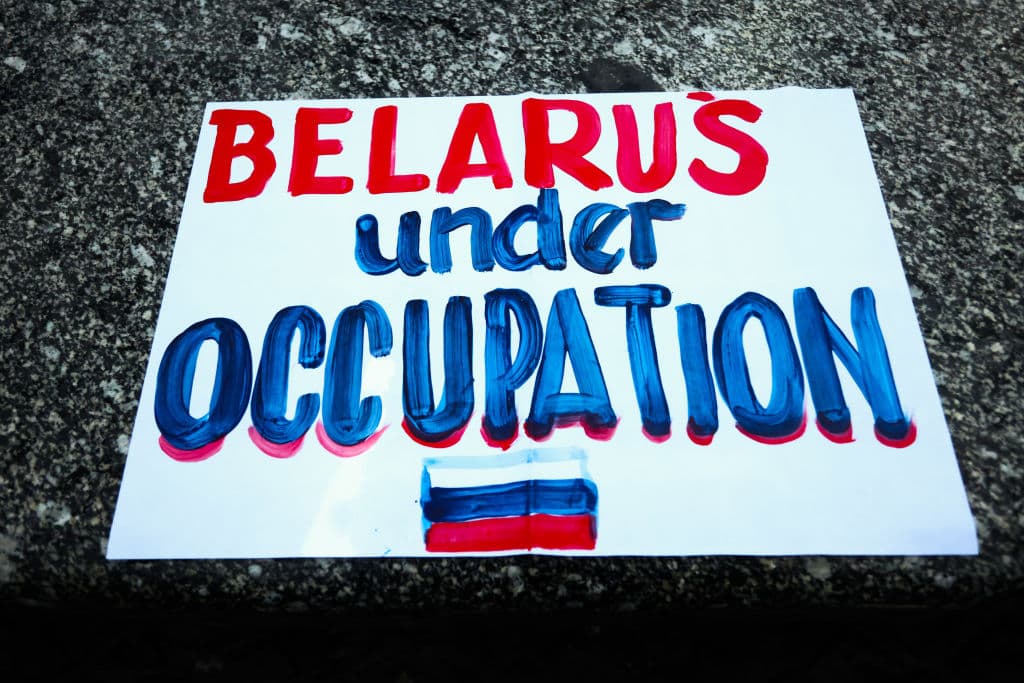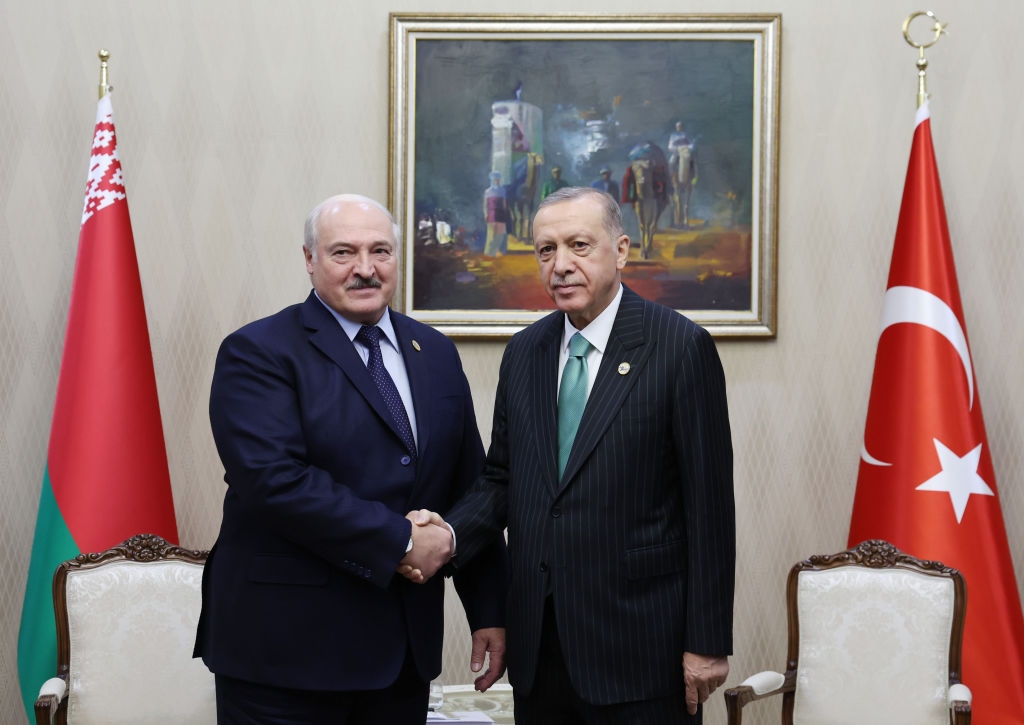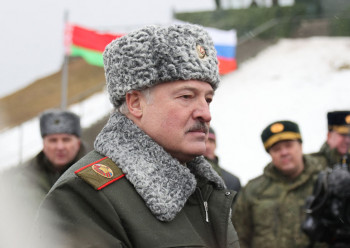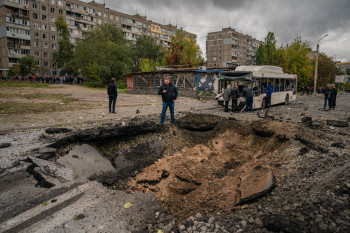Belarus Weekly: Minsk to welcome 9,000 Russian troops, as covert mobilization is ongoing in Belarus

Belarus to welcome 9,000 Russian troops. Meanwhile, a covert mobilization is ongoing in Belarus.
Belarus' dictator Alexander Lukashenko warns of a so-called "increased risk of terrorist threats" in Belarus, as authorities give contradicting statements about an alleged "counter-terrorist regime" in the country.
Ukraine is considering abolishing Kyiv's visa-free regime with Minsk amid Belarus' continued support of Russia's full-scale war.
Minsk's financial situation continues to deteriorate, as the World Bank labels Belarusian loans as "nonperforming." Belarus has $68 million in overdue payments.
Lukashenko's anticipated amnesty law, which he claimed would free some political prisoners, falls flat. Belarusian authorities continue to give out harsh sentences to those who oppose the regime.
Russian troops, military equipment arrive in Belarus as part of joint regional military command
Belarus' Defense Ministry announced on Oct. 16 that the joint regional military command would have around 9,000 Russian troops.
On Oct. 15, Belarus' Defense Ministry announced the arrival of the first group of Russian servicemen to Belarus after the Oct. 10 announcement. Around 170 Russian tanks, up to 100 artillery, and 200 combat vehicles are also expected to arrive.
The Belarusian Defense Ministry's official Valery Revenko claimed that the decision to create a joint regional military command alongside Russia is "solely to strengthen the defense of (Belarus') borders."
The command primarily consists of the Belarusian army but receives the support of Russian troops, Lukashenko said. He added that around 70,000 Belarusian soldiers would join the force. Belarus doesn't have that many soldiers.
The news comes amid heightened threats of potential attacks on Ukraine from Belarusian territory. Experts say that the out-of-practice Belarusian army likely wouldn't significantly impact the war, but the growing Putin-Lukashenko ties have reignited concerns.
Rumors spread surrounding covert mobilization in Belarus
On Oct. 13, Belarusian media reported that Lukashenko had started covert mobilization in Belarus, signaling a potential escalation of Russia's war against Ukraine. The Belarusian publication said neither the goals nor the scale of the mobilization is clear.
Lukashenko has not publicly announced mobilization.
He emphasized on Oct. 4 that Belarus does not need to announce mobilization, blaming rumors on those who oppose his regime.
However, he noted that Belarusian authorities are conducting checks on military personnel and those liable for military service.
On Oct. 10, Lukashenko announced the creation of a joint Russia-Belarus military command, which entails stationing Russian troops on Belarusian territory.
While Lukashenko claims that Minsk's part of the joint force will comprise around 70,000 Belarusian soldiers, experts suggest that Belarus' Armed Forces are made up of only 45,000 service people.
To reach Lukashenko's number, additional personnel must be drafted.
Reports of Belarusian citizens receiving subpoenas to military enlistment offices have continued, spurring additional rumors of potential mobilization in Belarus.
The report comes a few weeks after Russian President Vladimir Putin called for mobilization amid humiliating military defeats on the battlefield in Ukraine. Facing pressure, Russia has been dragging Belarus into openly joining the war.
Lukashenko declares 'counter-terrorist operation regime' in Belarus
Speaking at a summit in Kazakhstan on Oct. 14, Lukashenko declared a "counter-terrorist operation regime" in the country due to what he called an "escalation" on Belarus' borders.
The measure was reportedly first announced on Oct. 10, when Lukashenko instructed Belarus' KGB to prepare.
Belarusian Foreign Minister Vladimir Makei repeated the announcement, adding that Belarus' army and special services are "ready to respond to any provocations from neighboring countries."
"There was information that some neighboring states were planning provocations related to the seizure of certain parts of Belarusian territory," Makei claimed in a comment to Russian state-controlled media.
Lukashenko has repeatedly accused neighboring Ukraine of allegedly planning attacks on Belarus without citing evidence. Ukraine has denied these claims and called for an international mission to monitor the Ukraine-Belarus border.
The Belarus KGB denied claims that the country enacted a "counterterrorist regime."
Belarusian law stipulates that, during "counter-terrorist" measures, law enforcement are permitted to detain citizens without due process, enter premises, and have greater control over the media.
However, there are no specific legal provisions for "counter-terrorist operation regimes," so some experts suggest that Belarusian authorities have been using the terms synonymously and that the measure may not change the status quo in Belarus.

Turkish President Recep Tayyip Erdogan (R) shakes hands with Belarus dictator Aleksandr Lukashenko (L) during their meeting in Astana, Kazakhstan, on Oct. 13, 2022. (Photo by Turkish Presidency / Getty Images)
Ukraine to consider canceling visa-free regime with Belarus
President Volodymyr Zelensky has called on Ukraine's government to consider abolishing Kyiv's visa-free regime with Minsk in line with a petition which received over 25,000 signatures.
Belarusians are officially permitted to enter Ukraine for 180 days without a visa. As of Feb. 24, all checkpoints but one are closed at Ukraine's border with Belarus.
Ukrainian Ambassador to Belarus Ihor Kyzym noted that the proposed measure should be thought through due to "the current circumstances," as Lukashenko's regime may impose retaliatory measures that may prevent Ukrainians from fleeing Russia via Belarus or getting back to Ukraine.
Ukraine introduced a visa regime with Russia on July 1.
Lukashenko's 'amnesty' promise falls short
On Oct. 12, Belarusian authorities published a much-awaited draft amnesty law, which Lukashenko claimed would exonerate some political prisoners.
The draft law, which will supposedly apply to around 8,000 prisoners, mentions potential amnesty for those caring for large families, single mothers, and people with disabilities. However, those convicted of crimes typically attributed to political prisoners, such as "treason," "inciting hatred," and "terrorism," are exempt from the draft.
"Practically every article for which political prisoners are convicted are included in the list to which the amnesty does not apply," a lawyer with the human rights watchdog Viasna, Pavel Sapelka, noted.
According to Sapelka, 99% of political prisoners will not be released should the law be adopted in its current form.
Lukashenko said he would grant amnesty to prisoners who "really deserve it" on Sept. 17, Belarus' National Unity Day. He claimed that those arrested during protests in the aftermath of the fraudulent 2020 Belarusian presidential election would be considered for amnesty.
While Belarusian journalist Aleh Hruzdzilovich, human rights activist Tatsiana Lasitsa, and Halina Mikhalchuk received official pardons on the week of Sept. 19, experts note that these are likely individual exemptions.
World Bank says Belarus' loans are 'nonperforming'
The World Bank announced on Oct. 17 that it had put all loans to Belarus into "nonperforming status" effective immediately due to overdue payments.
As of Oct. 14, Belarus' overdue payments amount to $68.43 million. The World Bank notes that the principal amount outstanding on IBRD loans is $967 million. Minsk has failed to make repayments for over six months.
As per its statement, all International Bank for Reconstruction and Development (IBRD) loans to or guaranteed by Belarus are affected.
The World Bank stopped all programs in Russia and Belarus in early March amid Russia's full-scale invasion of Ukraine, citing "hostilities against the people of Ukraine."
Politically motivated trial results in harshest prison sentence thus far
Belarusian authorities doled out prison sentences to 12 people on Oct. 17 in a politically motivated closed trial. Authorities accused them of having committed arson against police property, among other crimes.
Belarusian businessman Mikalai Autukhovich and 11 people connected to him are accused of crimes ranging from "treason" and "involvement in a criminal organization" to "arson" and "inciting hatred."
The trial highlighted the individuals' alleged involvement in setting two police cars on fire and the home of a Belarusian law enforcement officer in October 2020. All three incidents did not result in casualties.
Autukhovich was sentenced to 25 years in prison, the lengthiest sentence given out during a politically motivated trial thus far.
Belarusian authorities continued persecuting those who opposed Lukashenko's regime in politically motivated trials.
In an unrelated trial, Belarus' KGB added Volha Loika and Alena Talkachova, former journalists for the country's largest independent news outlet TUT.BY, to its list of alleged "terrorists."
In May 2021, Belarusian authorities opened a politically motivated criminal case against TUT.BY for allegations of tax evasion and detained 15 people.
In October 2021, Belarus' Investigative Committee initiated an additional criminal case against the outlet's employees for allegedly "inciting hatred."











